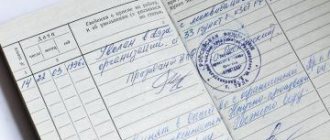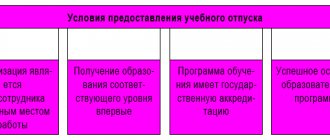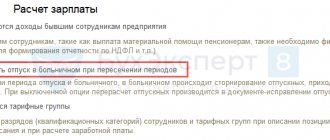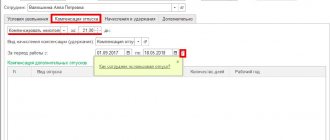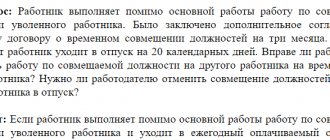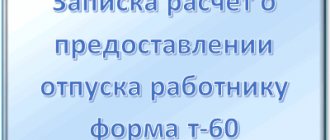An employee of an enterprise can get sick at any time - during work and during vacation, and each time he is paid differently. Calculations of payments for temporary disability are always calculated on an individual basis, depending on the average salary, the time of sick leave, the number of sick days in the current billing period, the type of sick leave, and so on. Let's find out by what rules sick leave is issued and paid during vacation followed by dismissal.
What are the features of sick leave during vacation followed by dismissal?
Sick leave during vacation followed by dismissal is not a typical situation, and therefore it differs in some features associated with the following points:
- the date of issue of the order to dismiss the employee;
- the employee’s right to leave;
- carrying out the transfer of dismissal;
- the procedure for calculating payments to a dismissed employee.
The head of the company must simultaneously issue 2 orders in relation to one of his subordinates:
- order to grant the employee leave (form No. T-6);
- order to dismiss an employee (Form No. T-8).
The date of dismissal of the employee and the last day of his vacation should not coincide.
If an employee is fired for violating the labor discipline of the enterprise, he does not have the right to leave, after which he could have been fired. If there is a certificate of incapacity for work, then leaving work will be dated on the first working day after leaving sick leave.
If an employee takes sick leave when the manager has already issued a dismissal order, the dates relating to leave and dismissal should not be changed.
If an employee loses his job immediately after he goes on vacation, the money he earned and his work record must be transferred immediately, without waiting for the end of the vacation.
Vacation followed by dismissal is provided at the discretion of the employer - the law does not oblige the employee to satisfy the request.
There is also the opposite situation, when an employee managed to rest, taking advantage of part and full period of annual leave, but did not work these days - then leave not only cannot be granted, but overpaid vacation pay is also withheld from the employee’s salary in the amount of no more than 20% of the amount. salary
Is the newsletter paid for?
If an injury or illness occurs on vacation (when the contract has not yet been terminated), they will fall under the insured event and will be paid in full. If an insured event occurs after dismissal, but 30 days have not passed since the termination of the contract, the employee has the right to sick leave compensation after dismissal under Part 2 of Art. 5 of Law No. 255-FZ (who pays sick leave for a former employee and where to apply for payments if more than 30 days have passed since dismissal, we told here). But only if the sick leave is in his name and at the time of his illness he had not found a job. The first 3 sick days are paid by the employer, starting from the 4th - from the Social Insurance Fund budget.
We tell you more about the conditions and procedure for paying sick leave to a former employee after dismissal in a separate article, and you can find out what to do if the former employer refuses to make the payment here.
An example of how sick leave is issued during vacation followed by dismissal
Let's imagine the situation. Secretary Petrov I.I. submits an application for annual leave and dismissal of her own free will immediately after the rest. The manager agrees, the personnel service employees and the accounting department draw up documents according to which the due funds (last salary and vacation pay) will be paid on the last working day - October 29, 2016. After the dismissal was completed, Petrova issued a sick leave, in which the date of onset of the illness is November 21. 2016, and the closing day for sick leave is December 6, 2017.
When registering sick leave during the vacation period, the dismissal documents are not subject to change. The leave, although it is the main one, is not extended due to the period of incapacity for work, since the subordinate is fired.
Since Petrova managed to bring sick leave within the first month after the date of dismissal, she should be compensated for it. The post-dismissal benefit is paid in the amount of 60% of average earnings for the last 2 years, regardless of the length of insurance coverage. An employee cannot receive 2 payments at the same time, since sick leave is paid from November 29, 2016 - from the date of dismissal.
Vacation may be issued to an employee who resigns immediately upon its completion, and the dismissal order must be dated from the final day of vacation. Thus, the last day of work is not the day of dismissal, but the penultimate day of vacation.
Vacation cannot be extended due to sick leave. Petrova’s vacation was paid for from November 1, 2016 to November 28, 2016. From November 29, 2016, she began to receive money for sick leave for 3 days - November 29, 30 and 31, 2016. This money will be transferred from the employer's funds. Further, all sick days are compensated from the Social Insurance Fund budget in the amount of 60% of average earnings.
Is it possible to quit like this?
If a notice of resignation is submitted before or while on sick leave, the employee has the right to subsequent dismissal without service. Days of incapacity for work are counted towards the statutory 14 days. But there are other options.
In some cases, an employee must be dismissed at his request without working out: upon retirement, admission to an educational institution, etc. (Article 80 of the Labor Code of the Russian Federation). In this case, the employee leaving sick leave must indicate in his resignation letter the reason why he should not be assigned work.
Seasonal workers are given three days' notice of dismissal (Article 296 of the Labor Code of the Russian Federation).
If, after illness, an employee’s health status has changed significantly and it does not allow him to continue to perform his work, dismissal occurs under Art. 83 of the Labor Code of the Russian Federation - due to circumstances beyond the control of the parties. This circumstance must be confirmed by medical documents.
If a person wants to continue working, but his health does not allow it, the employer must offer him another place at the same enterprise where working conditions will allow him to work. But whether to agree or not is the employee’s personal choice.
You can quit and not work all the required days , if this issue was initially agreed upon with the employer and consent was obtained. In this case, the reason for termination of the employment contract will be the consent of the parties. This is legal, since an enterprise, at its discretion, can set a working period of less than two weeks.
How is sick leave processed during vacation followed by dismissal?
Vacation followed by dismissal is issued to the employee on the basis of a submitted resignation letter of his own free will.
An employee of the HR department is involved in processing the dismissal of this employee - you can generate documents in two ways:
- in the form of a free-form order granting leave with subsequent dismissal to the employee;
- in the form of two orders - in form No. T-6 on the provision of rest time, in form No. T-8 on dismissal.
Next, the accounting department receives orders to calculate payments to the dismissed employee - dismissal pay (salary, bonus, allowances, additional payments, increasing coefficients) and vacation pay.
The HR department employee completes the dismissal procedure by making an entry about the dismissal in the work book and closing the employee’s personal card.
Duration of processing
Working off is not a completely legal term. This is the name given to the two-week period given to the employee after he writes a letter of resignation under Part 1 of Art. 80 Labor Code of the Russian Federation. During these 14 days, the employee has the opportunity to reconsider his decision and transfer matters to the person who will subsequently take his place. Then the employment contract is terminated.
It happens that after writing a statement, a person changes his mind and wants to stay. In this case, you have the opportunity to pick up the document and continue working.
But if by this time a replacement has already been found for the employee, the employer does not have the right to refuse the employee taken in his place and will be forced to dismiss the one who wrote the application anyway, therefore, before officially notifying management about your departure, it is important to carefully weigh everything and understand that, if you change your mind , you can still lose your job.
Three to fourteen days
If the decision is made and the application is written, no one has the right to detain the employee for more than two weeks. During this time, he is either present on site and transfers cases, or the following situations occur:
- working hours occur on holidays (for example, the weekend after the New Year);
- the employee goes on his next annual leave (if he did not have time to exercise this right, compensation must be received);
- the person is absent due to illness (sick leave is included in the pay off upon dismissal).
The work does not have to last two weeks. This period may be reduced to three days in the following cases:
- the employee is on a probationary period;
- the duration of the employment contract is less than 60 calendar days;
- The contract states that the employee is hired for one season.
You must notify management of your desire to stop working by writing a statement.
Quick dismissal
Management may also release an employee earlier by agreement of both parties or in the following circumstances:
- employee retirement;
- enrollment in an educational institution;
- gross violations of the employment contract;
- moving to another region for work, health reasons or changing permanent place of residence;
- transfer of a military spouse;
- pregnancy;
- caring for a child or sick relative.
For these reasons, actual dismissal may occur on the day the application is written, but it is usually required to provide evidence proving the right to leave without working time.
This may be an order for the transfer of a spouse, a health certificate, an extract from the previous place of residence and other documents appropriate to the case.
You can also go on sick leave followed by dismissal without work if the incapacity for work lasts for 14 days after the application was submitted to superiors.
How is sick leave paid during vacation followed by dismissal?
It doesn’t matter for what reason an employee is fired, sick leave must be compensated in any case.
The actions of an employee who wishes to receive payment for a certificate of incapacity for work are as follows:
- bring the head of the enterprise a sick leave certificate (issued within a month after dismissal, no later) within six months from the date of dismissal;
- demand payment of benefits for sick leave issued due to illness, poisoning, injury to the employee himself, as well as the need to care for a sick family member (not if the sick leave was issued after dismissal);
- demand sick leave benefits calculated according to the minimum wage (7,800 rubles from July 1, 2022), if there is no data on average earnings for the past 2 years.
How to calculate payment for sick leave?
The payment depends on several indicators:
- The coefficient of work experience accumulated by the employee (from 8 years - 1; 5-8 years - 0.8; from 6 months to 5 years - 0.6).
- The duration of the illness indicated on the sick leave certificate.
- The employee’s average daily earnings for the 2 calendar years preceding the illness (consists of wages, bonuses, all types of additional payments and compensation provided in money, goods or services; payment for housing, vouchers and other income from the organization). Average earnings are divided by 730.
Example:
The employee worked for the company for 3 years and earned 30,000 rubles. per month. While on vacation I received sick leave for 7 days.
Average daily earnings are calculated using the formula:
(360000 + 360000) / 730 = 968 rub.
Compensation based on length of service will be:
968 rub. x 0.6 x 7 = 4065 rub. 60 kopecks
Of these, the employer will pay for 3 days (1,742 rubles 40 kopecks), and the rest will be paid by the Social Insurance Fund.
If sick leave is opened within 1 calendar month after termination of the contract, 60% of average earnings will be paid. Experience is not taken into account.
If there is no data on average earnings, it is calculated according to the current minimum wage.
Common mistakes
Error: An employee demands an extension of his main leave with subsequent dismissal for the period of time that he spent on sick leave.
Comment: In general, annual leave should be extended by the number of days indicated on the sick leave issued during the rest period. But not in the case of vacation followed by dismissal - in such a situation the vacation is not extended.
Error: An employee is going to complain to the Labor Inspectorate about an employer who refused to provide him with leave followed by dismissal.
Comment: Providing leave, after which the employee immediately leaves work, is not the responsibility of the employer, so he is guided by the current state of affairs at the enterprise.
In what cases is the period of incapacity counted towards working off?
If an employee submits a letter of resignation of his own free will and then goes on sick leave, then the countdown of days until the termination of the employment contract begins solely from the date of writing the letter. This means that you can officially notify the employer of your decision, spend the legally required 14 days at home, and immediately quit after returning to work.
When the certificate of incapacity for work is closed before the date of dismissal, the employee will have to work, but less. And if the illness is long-term, then dismissal is formalized on the due day, and after recovery the company pays the employee sick leave.
The law allows payment for sick leave after payments in connection with dismissal. The accountant needs to have a closed sheet in hand in order to make the calculations correctly.
Another option to resign is to apply from home while on sick leave. In this case, the document can be sent by registered mail with an inventory and receipt of receipt. From the date the employer receives the application, the countdown of the required 14 days of work begins, which the employee can spend entirely or partially at home.
The fact that an employee is on sick leave is not a reason to postpone the dismissal date , forcing him to actually be present at the enterprise for another 14 calendar days.
If the employer does not agree that days of incapacity for work are counted as working time in these cases, the employee must contact the labor inspectorate or court. At the same time, he needs to have on hand documentary evidence of receipt by the enterprise of his resignation letter, as well as a certificate of incapacity for work.
Answers to common questions about sick leave during vacation followed by dismissal
Question No. 1: Will I be paid for sick leave if I took it out during my main vacation followed by dismissal?
Answer: Yes, a certificate of incapacity for work provided to the employer within a month from the date of dismissal is subject to compensation in the amount of 60% of the average income for the 2 years preceding the insured event.
Question No. 2: I was fired for repeated violations of labor discipline, can I request leave with subsequent dismissal?
Answer: No, in such a situation the employee is not entitled to leave.
Procedure for dismissing an employee going on vacation
The frequency of vacations in the organization is regulated by the vacation schedule.
This document is mandatory for both employees and the employer. Therefore, if an employee decides to go on vacation with subsequent dismissal, and no vacation is planned during this period, it is necessary to obtain the consent of the employer. If the employer is against it, then going on vacation followed by dismissal will not be possible. Unauthorized going on vacation is qualified as absenteeism, and the employee can be dismissed “under the article” (subparagraph “a”, paragraph 6, part 1, article 81 of the Labor Code of the Russian Federation).
Some employees may take time off without considering the employer's opinion. These include, for example, persons raising disabled children, mothers with two or more children under the age of 12, Chernobyl victims, etc.
The day of dismissal of an employee going on vacation with subsequent dismissal will be considered the last day of vacation (Part 2 of Article 127 of the Labor Code of the Russian Federation).
Is it considered legal to quit while on sick leave?
Provisions of Art. 81 of the Labor Code of the Russian Federation prohibits the dismissal of an employee on sick leave. But this only applies to cases where the employer wishes to terminate the employment contract. In the case where the employee himself wants to resign, there are no contradictions with the law. This is confirmed by letter of the Federal Service for Labor and Employment dated September 5, 2006 No. 1551-6, as well as judicial practice (for example, the ruling of the Orenburg Regional Court dated April 21, 2016 in case No. 33-3155/2016). The date of dismissal will be considered the one specified in the application; in this case, sick leave is included in the work off upon dismissal.
IMPORTANT! According to Art. 7 of Law No. 255-FZ, sick leave benefits are paid to a dismissed employee at the rate of 60% of average earnings. But this rule does not apply in cases where the application for dismissal is submitted while on sick leave or if the employee falls ill during the working period. In these cases, the benefit is calculated based on the insurance period.
Read about how to properly pay for sick leave in the article “Accruing sick leave - an example.”
But if the dismissal occurred at the initiative of the employer, and subsequently the employee brought sick leave, the start date of which falls on the day of dismissal, then this fact will not be the basis for reinstatement at work, although paying sick leave and postponing the date of dismissal specified in the order and work book , have to. This is stated in paragraph 27 of the resolution of the Plenum of the Supreme Court of the Russian Federation “On the application by the courts of the Russian Federation of the Labor Code of the Russian Federation” dated March 17, 2004 No. 2.
